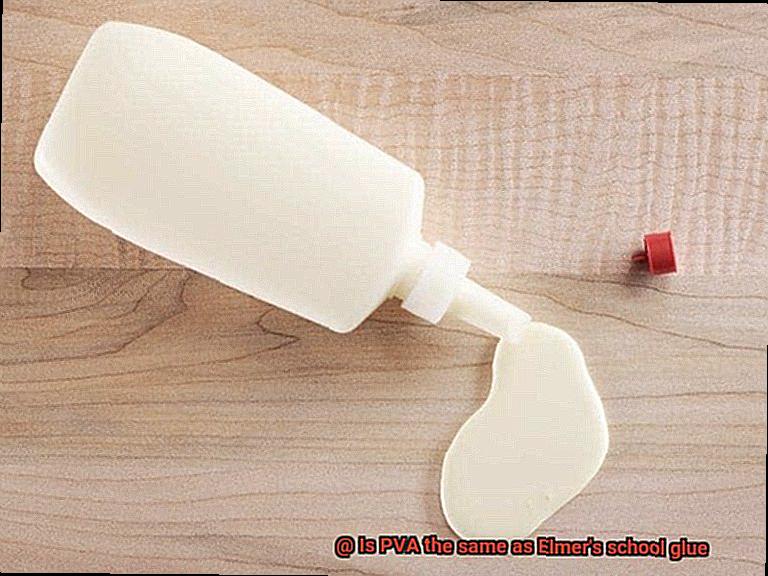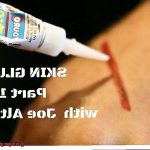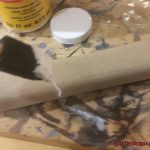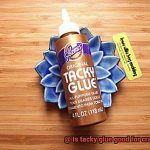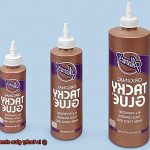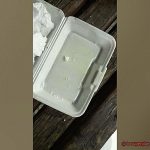Choosing the perfect adhesive for your crafting and DIY escapades can be as mind-boggling as solving a Rubik’s Cube. Two contenders that often steal the limelight are PVA glue and Elmer’s school glue. But here’s the burning question: are they truly cut from the same cloth? Today, we embark on an exhilarating exploration of these adhesive powerhouses to uncover their shared traits and subtle differences, equipping you with the wisdom needed to select the ideal glue for your projects.
PVA (Polyvinyl Acetate) glue and Elmer’s school glue may seem like siblings in the world of white glues, famous for their ability to bond various materials with ease. Yet, don’t be fooled by their superficial resemblance – each has its own unique features, tailored for specific applications. So buckle up tight as we plunge into the captivating realm of adhesives, dispelling myths and arming you with invaluable insights along the way.
Are you itching to uncover the secrets behind their viscosity, drying time, or bond strength? Or perhaps you yearn to witness their performance on diverse materials like paper, wood, fabric, or plastic? Worry not. We won’t leave a single stone unturned. Keep reading to quench your curiosity about PVA glue and Elmer’s school glue – knowledge that will empower you to make informed decisions when tackling your next creative venture.
Remember: choosing the right adhesive can make or break your project. Join us on this thrilling journey as we demystify PVA glue and Elmer’s school glue, enabling you to confidently wield the perfect adhesive for your crafting triumphs. Prepare yourself for a deep dive into the realm of glues – soon enough, you’ll become an expert at distinguishing these adhesive champions from one another.
What is PVA Glue?
Contents
PVA glue, short for polyvinyl acetate glue, is the secret weapon you need in your creative arsenal. But what exactly is PVA glue and why is it so popular? Let’s dive into the fascinating world of this versatile adhesive and discover its many uses.
PVA glue is a water-based adhesive that is made from a synthetic polymer called polyvinyl acetate. Derived from petroleum, this remarkable glue is known for its reliable adhesion and strong bond. From paper to wood, fabric to certain plastics, PVA glue can stick almost anything together. Whether you’re creating a stunning collage, building a model, or fixing a broken chair leg, PVA glue has got your back.
But PVA glue isn’t just about sticking things together. It’s also about exploring new textures and finishes. Mix PVA glue with paint, and you can create glossy or matte effects on surfaces. Artists and crafters rejoice. This glue allows you to unleash your creativity in ways you never thought possible.
And here’s the best part: PVA glue is safe to use for both adults and children. It’s non-toxic and free from strong fumes or odors, making it perfect for indoor projects. Just remember to supervise young children when they’re working with any type of glue.
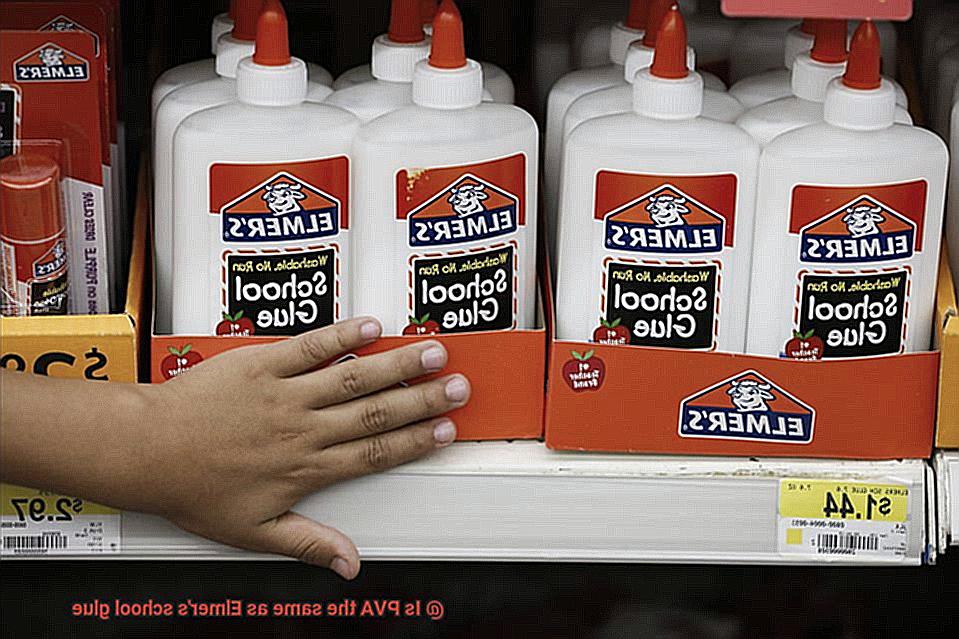
But wait, not all school glues are created equal. While Elmer’s school glue is a type of PVA glue, there are other school glues available that may not be PVA-based. To avoid any sticky situations, always check the label or product description to ensure you’re using the right glue.
What is Elmer’s School Glue?
Elmer’s School Glue is not just any ordinary adhesive; it’s a crafting essential that has become a household name. But what exactly is Elmer’s School Glue? Let’s dive into the world of this versatile and beloved glue.
At its core, Elmer’s School Glue is a type of adhesive known as polyvinyl acetate, or PVA for short. PVA glue has been around for decades and is known for its incredible versatility, ease of use, and non-toxic nature. It’s made from a synthetic polymer called polyvinyl acetate, which gives it its sticky properties.
When you think of Elmer’s School Glue, you probably picture the iconic white bottle with the eye-catching orange label. It comes in various sizes, from small bottles perfect for individual projects to larger containers suitable for group activities. No matter the size, the glue itself has a thick and viscous consistency, making it easy to apply and providing a strong bond once dried.
One of the standout features of Elmer’s School Glue is its safety. It is non-toxic, which means it’s perfectly safe to use by children and adults alike. You can rest easy knowing that even if it accidentally gets on your skin or in your mouth, there won’t be any harmful effects. Of course, it’s always a good idea to follow basic safety precautions like avoiding contact with eyes and mouth and washing hands after use.
But what makes Elmer’s School Glue so loved by crafters and DIYers? Its bonding abilities are second to none. It can stick to a wide range of materials like paper, cardboard, fabric, and wood, making it perfect for all sorts of crafting projects. Whether you’re making collages, building models or creating homemade decorations, Elmer’s School Glue will get the job done. And the best part? The glue dries clear, so you’ll get a neat and professional finish every time.
Another standout feature of Elmer’s School Glue is its water-solubility. This means that if you make a mistake or want to reposition your project while gluing, you can simply dampen the glued area with water and adjust accordingly. Once the glue is completely dry, it becomes permanent and provides a strong bond that can withstand normal wear and tear.
How Do PVA and Elmer’s School Glue Differ?
Choosing the right adhesive is crucial for successful arts and crafts projects. Two popular options are PVA glue and Elmer’s School Glue, each offering unique features and benefits.
In this article, we will explore the differences between these two glues, including viscosity, drying time, and packaging. Let’s dive in and discover which glue best suits your crafting needs.

Viscosity:
PVA glue and Elmer’s School Glue differ in viscosity. PVA glue is slightly thicker, making it ideal for projects that require a stronger bond or working with porous materials like wood or fabric. Elmer’s School Glue offers a smoother flow, perfect for delicate paper crafts.
Drying Time:
Drying time is another significant factor to consider. PVA glue has a longer drying time, allowing for adjustments and ensuring a secure bond. Elmer’s School Glue dries relatively quickly, making it ideal for quick crafts or when you need to move on without delay.
Packaging:
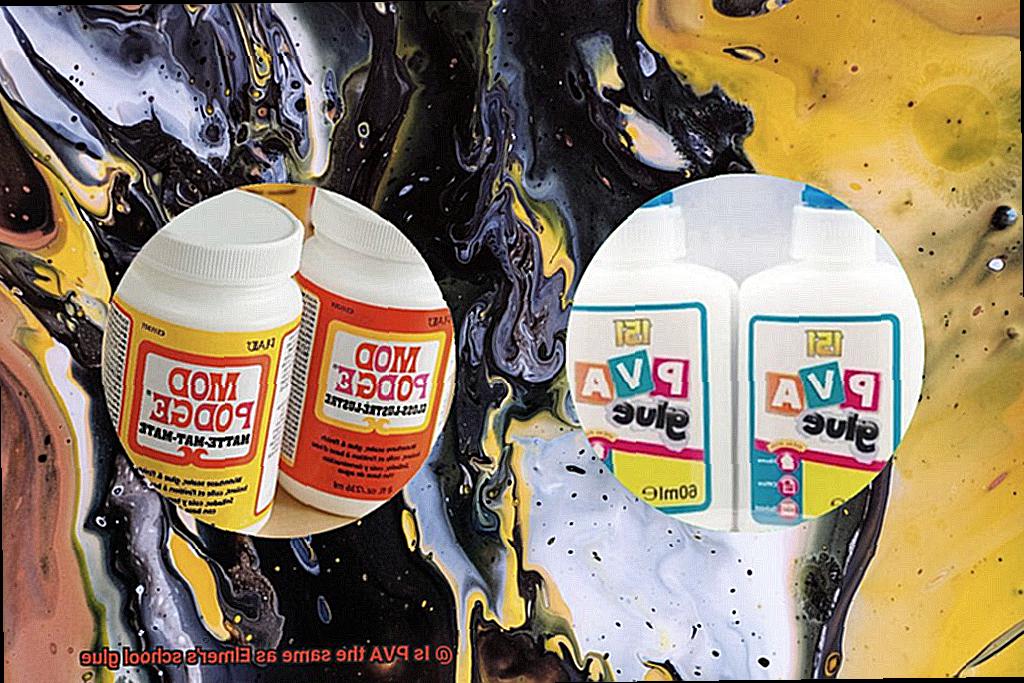
The packaging of these glues also differs. Elmer’s School Glue features colorful bottles and user-friendly applicators designed for school use. It adds a touch of fun while preventing spills and messes. PVA glue comes in generic packaging catering to a wider range of users, providing all the necessary functionality without the playful design.
Properties of PVA Glues
PVA glues, also known as Polyvinyl Acetate glues, are the ultimate choice for school projects, arts and crafts, and DIY home repairs. Why? Let’s dive into their magical properties that make them versatile and reliable adhesives.
Firstly, PVA glues have a remarkable bonding ability. They effortlessly bond a variety of materials together, including wood, paper, fabric, and cardboard. With their power to bring different elements together, they are perfect for constructing model houses or creating intricate paper crafts.
Strength and durability are also key properties of PVA glues. Once dried, they form an unyielding bond that can withstand everyday wear and tear. This strength is crucial for DIY home repairs, where a strong and reliable bond is necessary to fix broken items or attach new components.
But that’s not all. PVA glues offer some level of water resistance. Although they are not completely waterproof, they can handle light exposure to water without losing their adhesive properties. This makes them suitable for outdoor decorations or items used in damp environments like bathrooms.
Ease of use is another standout property of PVA glues. They have a relatively long open time, giving users ample time to adjust and reposition their glued pieces before the glue sets completely.
Additionally, cleanup is a breeze since PVA glues can be easily washed away with water before drying.
And here’s the cherry on top: PVA glues are non-toxic and safe for use by children. Brands like Elmer’s School Glue are specifically designed for school projects and crafts involving young learners. Their non-toxic nature ensures a worry-free creative experience.
Properties of Elmer’s School Glue
Prepare to embark on a captivating journey into the captivating world of adhesives. Today, we will pull back the curtain on the marvelous properties of Elmer’s School Glue. This extraordinary product is adored by students, teachers, and crafting enthusiasts alike. Join us as we explore why Elmer’s School Glue is truly a masterpiece in the realm of adhesives.
The Power of Polyvinyl Acetate (PVA):
Elmer’s School Glue is crafted using the mighty force of polyvinyl acetate (PVA), a synthetic polymer renowned for its exceptional adhesive capabilities. With its versatile nature, this glue can bond an array of materials including paper, fabric, wood, and even certain plastics. With Elmer’s School Glue, your creative possibilities are boundless.
Safety First, Always:
Created with school use in mind, Elmer’s School Glue is a safe and non-toxic option for children. It is water-based, which means it can be easily cleaned up with just water and soap. Parents and educators can breathe a sigh of relief, knowing that creativity can flourish without compromising safety.
The Beauty of Transparency:
Are you working on projects that require an invisible bond? Look no further. Elmer’s School Glue dries clear, offering a seamless finish that allows your craftsmanship to shine without any unsightly residue. Whether it’s scrapbooking, collages, or delicate artworks, this glue ensures a neat and professional appearance.
Precision Meets Simplicity:
With its luxuriously thick consistency, Elmer’s School Glue provides effortless application and control. It securely adheres surfaces together while allowing ample time for adjustments before it sets. From intricate details to larger projects, this glue has got you covered.
Time Is of the Essence:
In the fast-paced world of classrooms and craft rooms, efficiency is paramount. Elmer’s School Glue boasts a quick drying time, allowing students and creators to complete projects in a breeze. No more impatiently waiting for glue to dry – it’s time to unleash your creativity.
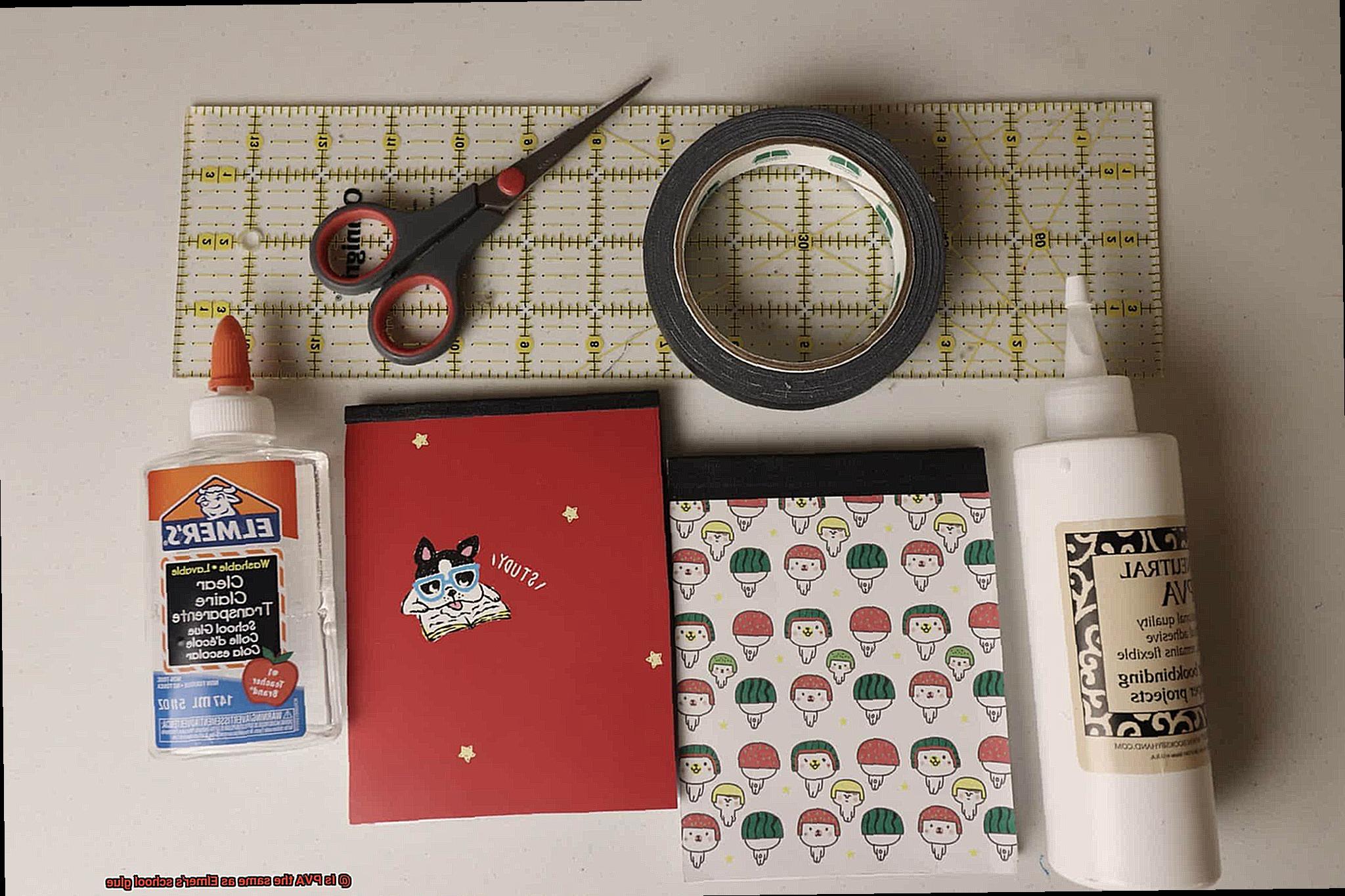
Preservation for Eternity:
For archival projects or long-term preservation, you need a glue that will stand the test of time. Elmer’s School Glue is acid-free, ensuring it won’t damage or deteriorate materials over the years. Your precious memories and valuable creations are in safe hands.
Sizes for Every Need:
Elmer’s School Glue understands that individual needs vary. That’s why it is available in various sizes, catering to both solo artists and classroom or group projects. No matter the scale of your creative aspirations, you’ll find the perfect size to suit your needs.
Uses for PVA and Elmer’s School Glue
If you’re seeking a versatile adhesive that can tackle all your arts and crafts endeavors, then PVA and Elmer’s School Glue are your ultimate go-to options. These water-based wonders are safe, user-friendly, and boast a plethora of uses. Let’s embark on a journey to explore the captivating possibilities.
Arts and crafts enthusiasts, rejoice. PVA and Elmer’s School Glue are absolute perfection when it comes to bonding paper, cardboard, fabric, foam, and other porous materials together. Whether you’re fashioning collages, delving into scrapbooking, or constructing three-dimensional masterpieces, these glues will securely hold everything in place with effortless finesse.
PVA glue is your secret weapon for all things wood-related. Its robust adhesive properties make it an ideal choice for assembling furniture, repairing wooden objects, or crafting intricate designs. Bid farewell to loose joints and embrace the creation of sturdy marvels.
PVA and Elmer’s School Glue also have a remarkable role in the realm of DIY home improvement. Need to bond tiles or wallpaper to your walls? These glues have got you covered. It’s important to note that while they may not be as durable as specialized adhesives for certain applications, they still wield their magic for many home improvement projects.
Yearning for a flawless finish on your next painting endeavor? PVA glue can act as a sealant or primer for porous surfaces like wood or concrete. It effortlessly fills in gaps and imperfections, resulting in a smoother surface that’s primed and ready for a professional-looking paint job.
Here’s a captivating tidbit: did you know that you can concoct your very own version of Mod Podge using PVA glue? Mix it with water, and voila. You’ve unlocked a cost-effective alternative for decoupage, sealing artwork, or adding a glossy finish to various surfaces. Save money without compromising on quality.
Last but certainly not least, let’s delve into the world of slime. The fascination with slime has taken the world by storm, and PVA glue lies at the heart of it all. With a sprinkle of creativity and a dash of additional ingredients like borax or contact lens solution, you can concoct your very own slime masterpieces. Brace yourself for hours of gooey, stretchy fun.
Choosing the Right Adhesive for Your Project
When it comes to selecting the perfect adhesive for your project, there are several crucial factors to consider. Whether you’re embarking on a woodworking masterpiece, a creative craft project, or a general repair job, choosing the right adhesive is the key to ensuring success and durability.
Polyvinyl acetate (PVA), also known as PVA glue, is one of the most commonly used adhesives. This water-based adhesive is renowned for its ability to dry clear, making it ideal for woodworking, paper crafts, and general-purpose bonding. Elmer’s school glue, a popular brand of PVA glue, is specifically formulated for school and craft use. With its non-toxic and user-friendly properties, it’s a favorite among DIY enthusiasts.
While PVA and Elmer’s school glue have similar attributes, it’s essential to understand their differences before making a decision. Consider the specific requirements of your project. If you’re working with porous materials like wood or fabric, PVA glue is the ideal choice due to its exceptional penetration and bonding capabilities. However, if you’re in need of a stronger bond for materials such as metal or plastic, you may want to explore adhesives specially designed for those materials.
In addition to PVA and Elmer’s school glue, there is a wide range of other adhesives available on the market, each with unique properties and applications. Epoxy, super glue (cyanoacrylate), hot glue, and construction adhesive are just a few examples. To make an informed decision, take into account factors like drying time, flexibility, and resistance to moisture or heat. Reading product labels and following manufacturer instructions will ensure optimal results. In some cases, conducting a small test or seeking advice from experts in the field can provide valuable insights when selecting the most suitable adhesive for your project.
Safety Considerations when Using Adhesives
We all adore the power of glue to bond things together, but let’s not forget that safety should always take center stage. Adhesives contain chemicals that can pose risks if not handled with care. So, here’s a comprehensive guide to ensure your glue adventures are safe and sound.
First and foremost, let’s talk about ventilation. Those fumes are no joke. To prevent inhaling them, always work with adhesives in a well-ventilated area. Open those windows wide or switch on a fan to let that fresh air flow freely.
Now, it’s time to suit up in your superhero gear for glue-related missions. Put on gloves to shield your hands from direct contact with the adhesive, and goggles to protect your eyes from potential splashes or fumes. Safety first, my friends.
Reading instructions may not be the most thrilling part of the glue experience, but trust me, it’s vital. Different adhesives come with specific safety precautions and usage guidelines. So grab those instructions and follow them religiously. The manufacturers know what they’re talking about.
Did you know that some adhesives are flammable? That’s right – they can ignite. Keep those flammable buddies far away from open flames or sources of heat. And when you’re not using them, store them in a cool and dry place, away from direct sunlight.
Accidents happen – we get it. But in case of accidental ingestion or contact with adhesives, don’t panic (well, maybe panic just a little). Instead, seek immediate medical assistance. The packaging of most adhesives provides emergency contact information for situations like these.
Let’s not forget our little ones and furry friends. Keep adhesives out of reach of children and pets at all times. You don’t want them getting their paws on something toxic or causing potential hazards with accidental spills.
When it comes to disposing of adhesive containers or excess glue, it’s not as simple as tossing them in the trash. Different adhesives may require specific disposal methods due to their chemical composition. So, be sure to check your local regulations and guidelines.
Last but not least, let’s tackle those sticky spills. No one wants a mess that clings to everything. Use solvents or cleaning agents recommended by the adhesive manufacturer to remove any residue from surfaces or skin. Your future self will thank you for it.
sxTepK0ozGs” >
Conclusion
PVA and Elmer’s school glue may seem similar at first glance, but they are not exactly the same.
While both are types of adhesive, there are some key differences between them. PVA, or polyvinyl acetate, is a type of glue that is known for its strong bond and versatility.
It is commonly used in woodworking, paper crafts, and other applications where a durable adhesive is needed. On the other hand, Elmer’s school glue is a specific brand of PVA glue that is popular among students and teachers alike.
Despite being a brand of PVA glue, Elmer’s school glue may have slightly different properties compared to other PVA glues on the market.

